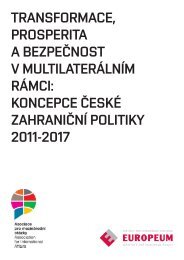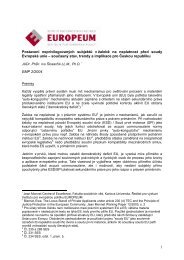eu constitutionalisation - EUROPEUM Institute for European Policy
eu constitutionalisation - EUROPEUM Institute for European Policy
eu constitutionalisation - EUROPEUM Institute for European Policy
You also want an ePaper? Increase the reach of your titles
YUMPU automatically turns print PDFs into web optimized ePapers that Google loves.
On 26 November, the Italian presidency published a set of compromiseproposals <strong>for</strong> a conclave of <strong>for</strong>eign ministers (28/29 November) that had theresponsibility to prepare <strong>for</strong> the 12/13 December 2003 <strong>European</strong> Council.As regards the double majority requirement, during the Irish presidencythe Spanish government had a single-minded bargaining approach focusingon the thresholds <strong>for</strong> a double majority. The Polish government had a morecomplicated approach to this issue. The German government was willingto compromise and it gradually emerged that President Chirac would alsocompromise on aspects of the voting system, as long as the double majoritywas maintained. However, the French position initially was ambiguousand French preferences were not clear. The removal of the Spanish PrimeMinister Azanar from power facilitated an easier bargaining process betweenFrance and Spain following Chirac’s anger at Azanar’s endorsement of theIraq war. The UK government was ‘agnostic’ on this issue.⁴⁰For negotiators of the treaty, a much bigger divide between states was aboutthe gap between the two thresholds in the Convention and in the <strong>for</strong>thcomingtreaty. The Finnish and Austrian governments were anxious to amendthe gap agreed in the Convention, as they felt it favoured large states. Theygathered substantial support mainly from new member states. The Frenchsought to retain the threshold as they regarded it as recompense <strong>for</strong> supportingthe double majority decision (an agreement they felt increased Germanpower). The final outcome maintained the Convention threshold.Size of Commission: During the Convention, the small states establisheda group called ‘Friends of the Community Method’. This was followed bymeetings in September 2003 among a large group of small states favouredthe retention of the principle of one Commissioner per member state. In theearly stages of the Irish presidency, the bargaining process centred almostexclusively on Poland, Spain, France and Germany with respect to the abovedouble majority issue. However, counter-tensions then developed about thesize of the Commission. Generally, the cleavage was between small statesand large states on this issue, whereby small states wanted to retain theirpermanent seat on the Commission. In addition, the QMV issue precipitatedvarious state responses, depending on the specific policy area.40) Interview with authors, 23.03.05.Chapter 3: The 2004 IGC: Bargaining or Learning?Chapter 3: The 2004 IGC: Bargaining or Learning?QMV: First, as in previous treaty negotiations, there was a cleavage betweenthose states that favoured more intergovernmental control and those thatfavoured supranational outcomes. Germany, France and the Benelux generallyfavoured shifting more policy areas to QMV than those with a moreintergovernmental approach. The United Kingdom was to the <strong>for</strong>e on thisissue with a series of red lines on which it would not move.For taxation, the lead states in the bargaining process were France, Germanyand the UK. The leaders of these three states met separately to reach a compromiseon introducing QMV <strong>for</strong> taxation. However, the Irish presidencyintervened in May to accelerate this process. In fact, there was an awarenessthat the taxation issue was ‘non-negotiable’ <strong>for</strong> the British government andthe French and German negotiators did not lobby beyond a certain point.However, in return they did seek QMV’s introduction <strong>for</strong> JHA. The UKgovernment offered QMV <strong>for</strong> this area, but subject to an emergency breakand enhanced co-operation. The offer was rejected by Chirac who did notwant any dilution of French proposals in this area.However, despite French rejection, overall, by 14 June there was a broadlyconsensus about these key bargaining issues, mainly because <strong>for</strong> French andGerman governments, the priority was to reach a final deal by the end of theIrish presidency. Hence, overall they were willing to compromise with theBritish government. Small states and mediumsized states did not attempt toinfluence all contentious bargaining issues. Often, they enjoyed the supportof a large state and relied on that state to achieve their preferences (<strong>for</strong> example,Ireland and the UK shared preferences on taxation). However, all smallstates had strong preferences on approximately two issues and concentratedlobbying on these issues. Thus, apart from the above large issues, there wereadditional issues of importance to specific states:g Common Commercial <strong>Policy</strong>: Intense preferences <strong>for</strong> Sweden, Finland:sought unanimity and achieved it.g Cohesion <strong>Policy</strong>: Greece wanted specific reference to ‘islands’ andachieved it.g Social security: Denmark wanted re-writing of Maastricht protocol andprovisions <strong>for</strong> social security <strong>for</strong> migrant workers achieved it?g Public health: Sweden and Finland sought specific provisionsg Trade and services: Sweden and Finland sought specific provisions.88 89








